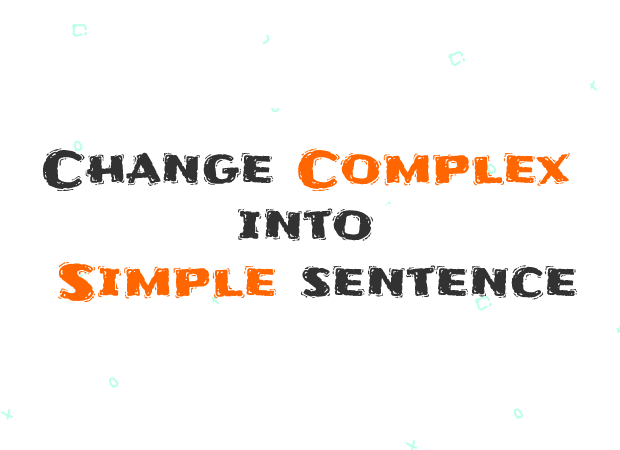প্রিয় শিক্ষার্থীবন্ধুরা, আশা করি ভালো আছেন। আমিও আল্লাহর রহমতে ভালো আছি। গত ব্লগে ‘Transformation of Sentence’ নিয়ে বিস্তারিত আলোচনা করেছি। আজকের ব্লগে “How to change Complex into Simple sentence বা কীভাবে Complex বাক্যকে Simple বাক্যে পরিবর্তন করা যায়” তা নিয়ে বিস্তারিত আলোচনা শেয়ার করবো। আশা করি আপনারা উপকৃত হবেন। তাহলে শুরু করা যাক।
Complex থেকে Simple এ পরিবর্তনের নিয়ম –
Rule 1: Since/as/when যুক্ত Complex
Sentence এর দুটি Clause এর Subject এক হলে এবং দুটি Clause এ মূল Verb থাকলে নিম্নের
নিয়মের মাধ্যমে Simple এ পরিবর্তন করা যায়।
গঠনপ্রণালীঃ Since/as/when উঠে যায় + প্রথম
Sentence এর মূল Verb এর Present form এর সাথে ing যোগ করতে হয় + প্রথম Clause এর
Verb এর পরের অংশ বসে + কমা (,) বসে + দ্বিতীয় Clause এর Subject এর জায়গায় প্রথম
Sentence এর Subject বসে + দ্বিতীয় Sentence এর বাকি অংশ বসে। যেমন –
Complex: Since the old man killed the
bird, he was punished.
Simple: Killing the bird, the old man
was punished.
Complex: When the thief saw the police,
he ran away.
Simple: Seeing the police, the thief
ran away.
Rule 2: Since/as/when যুক্ত Complex
Sentence এর দুটি Clause এর Subject ভিন্ন হলে এবং প্রথম Clause এ Be Verb থাকলে তাকে
Simple করার সময় –
গঠনপ্রণালীঃ Since/as/when উঠে যায় + Be
verb এর পরিবর্তে being/having বসে + দ্বিতীয় Clause টি বসে। যেমন –
Complex: Since the water was salty, they
could not drink it.
Simple: The water being salty, they
could not drink it.
Complex: When the meeting was over, we
went back home.
Simple: The meeting being over, we went
back home.
নোটঃ am/is/are/was/were থাকলে ‘being’ এবং
have/has/had থাকলে ‘having’ বসে।
Rule 3: Since/as যুক্ত Complex Sentence
এর দুটি Clause এর Subject এক হলে এবং since/as যুক্ত Clause টিতে শুধুমাত্র Be
Verb থাকলে তাকে Simple করার সময় –
গঠনপ্রণালীঃ Since/as এর পরিবর্তে
Because of বসে + Subject এর Possessive form বসে + Be verb এর পরিবর্তে being /
having বসে + Snetecne এর বাকি অংশ বসে + কমা (,) বসে + দ্বিতীয় অংশটি বসে। যেমন -
Complex: Since he was small, he could
not work hard.
Simple: Because of his being small, he
could not work hard.
নোটঃ am/is/are/was/were থাকলে ‘being’ এবং
have/has/had থাকলে ‘having’ বসে।
Rule 4: Relative pronoun যুক্ত Complex
sentence কে Simple sentence করার সময় –
গঠনপ্রণালীঃ বাক্যে Relative pronoun
(who, which, that) এর পূর্ব পর্যন্ত বসে + Relative pronoun উঠে যায় + Relative
pronoun এর পর সাহায্যকারী ক্রিয়া থাকলে উঠে যায় + পরবর্তী মূল verb এর সাথে ing যোগ
করতে হয় + বাকি অংশ অপরিবর্তিত থাকে। যেমন –
Complex: The writer lived in a cabin
that belonged to the orphanage.
Simple: The writer lived in a cabin
belonging to the orphanage.
Complex: I know what his name is.
Simple: I know his name.
Rule 5: When যুক্ত সময় নির্দেশক Complex
sentence কে Simple করার নিয়ম।
গঠনপ্রণালীঃ when উঠে যায় + when এর পরে যে
subject ও verb থাকে তা উঠে যায় + কম সময় বুঝালে at/in বসে => ঋতু থাকলে তার পূর্বে
in বসে => বয়সের উল্লেখ থাকলে তার পূর্বে at the age of বসে। যেমন –
Complex: When it is spring, the cuckoo
sings.
Simple: In spring, the cuckoo sings.
Complex: When he was three, he left his
village.
Simple: At the age of three, he left
his village.
কিন্তু When দ্বারা কোনো সময় না বুঝিয়ে কোনো
কাজ চলা বুঝালে তখন তার গঠন হবে – At the time of + when যুক্ত অংশের verb এর সাথে
ing + বাকি clause টি বসে। যেমন –
Complex: When it was raining, he woke
up.
Simple: At the time of raining, he woke
up
নোটঃ When যুক্ত অংশে কোনো Personal
subject এর উল্লেখ থাকলে উক্ত Subject এর Possessive রূপ বসে। যেমন –
Complex: When I was eating, he came.
Simple: At the time of my eating, he
came.
Rule 6: If দ্বারা গঠিত শর্তমূলক Complex
sentence কে Simple করার নিয়ম।
গঠনপ্রণালীঃ বাক্যটি Affirmative হলে by এবং
Negative হলে Without বসে + if থেকে Verb এর পূর্ব পর্যন্ত উঠে যায় + if যুক্ত
clause এর Main verb এর সাথে ing যোগ করতে হয় + Verb এর পরের অংশ বসে + দ্বিতীয়
Clause টি অপরিবর্তিত থাকে। যেমন –
Complex: If you do not read
attentively, you will not pass the examination. (Negative)
Simple: Without reading attentively,
you will not pass the examination.
Complex: If you work hard, you can
succeed in life.
Simple: By working hard, you can
succeed in life.
Rule 7: So that যুক্ত Complex sentence কে
Simple করার নিয়ম।
গঠনপ্রণালীঃ Sentence এর প্রথম থেকে so এর
পূর্ব পর্যন্ত বসে + so থেকে may/might/can/could পর্যন্ত উঠে যায় + to বসে + বাকি
অংশ বসে। যেমন –
Complex: He worked hard so that he
could prosper in life.
Simple: He worked hard to prosper in
life.
Rule 8: so ….. that যুক্ত Complex
sentence কে Simple করার নিয়ম।
গঠনপ্রণালীঃ so এর পরিবর্তে too বসে +
that থেকে not পর্যন্ত উঠে যায় + to বসে + বাকি অংশ বসে। যেমন –
Complex: He is so weak that he cannot
walk.
Simple: He is too weak to walk.
Rule 9: Though / Although যুক্ত Complex
sentence কে Simple করার নিয়ম।
গঠনপ্রণালীঃ Though / Although এর পরিবর্তে
in spite of বসে + Subject এর possessive form বসে + মূল Verb এর সাথে ing যুক্ত হয়।
কিন্তু Be verb থাকলে being / having বসে + বাকি অংশ বসে। যেমন –
Complex: Though he tried heart and
soul, he could not pass the examination.
Simple: In spite of his trying heart and
soul, he could not pass the examination.
Complex: Although the man is poor, he
is honest.
Simple: In spite of the man being poor,
he is honest.
আশা করি আপনি পুরো পোষ্টটি যত্ন সহকারে পড়েছেন এবং উপকৃত হয়েছেন। আর এটাই আমার সার্থকতা। আর এই পোষ্টটে যদি কোন ভুল দৃষ্টগোচর হয় তাহলে অবশ্যই কমেন্ট করে জানাবেন। পোষ্টটি যদি ভালো লাগে তাহলে শেয়ার এবং কমেন্ট করতে ভুলবেন না। আজ আর নয়, কথা হবে অন্য কোন দিন এবং নতুন কোন ব্লগে। ঐ পর্যন্ত সবাই ভালো থাকবেন এবং সুস্থ থাকবেন। আল্লাহ হাফেয।

